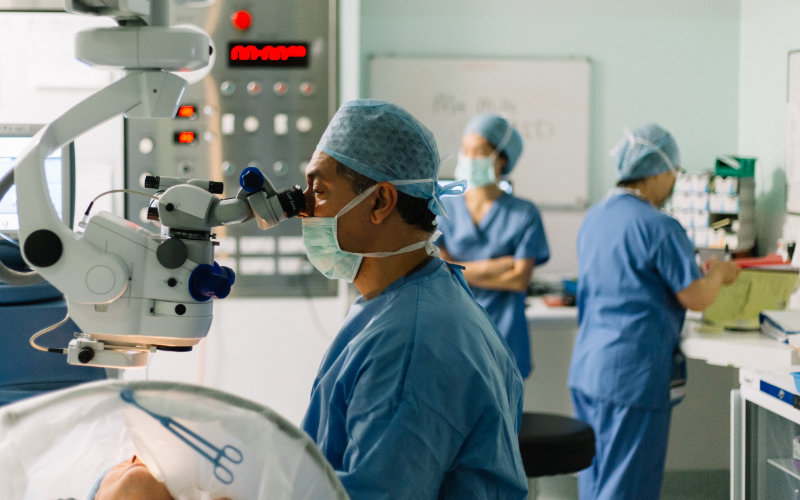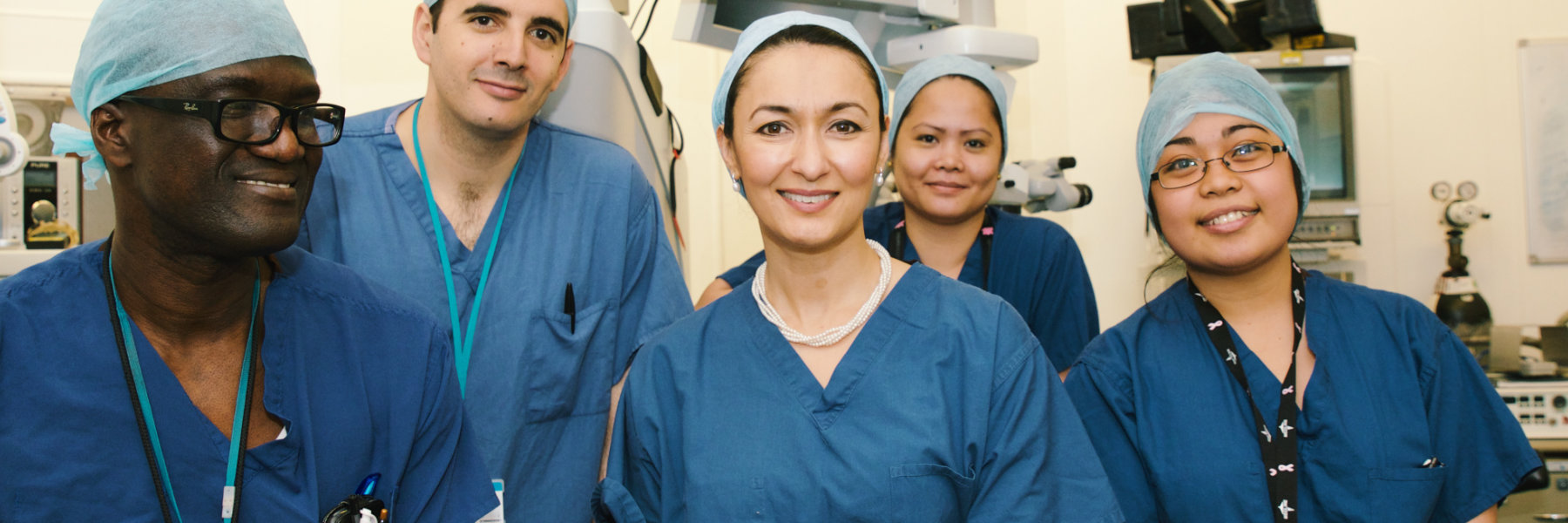Retinal detachment
What is retinal detachment?
The retina is the light sensitive film at the back of the eye and retinal detachment is a condition where the retina peels away from the inner wall of the eye. In most cases the retina detaches because a hole or a tear has formed in the retina allowing fluid to pass underneath the retina.
Most retinal detachments occur as a natural ageing process in the eye but certain people are at higher risk than others. These include people who are short sighted, those who have had cataract surgery in the past and those who have suffered a severe direct blow to the eye. Some types of retinal detachments can run in families but these are rare.
What can I expect after cataract surgery?
Vision is usually brighter, crisper and clearer, with better colour perception. In many cases I can select a lens implant that gives you clear distance unaided vision, which means that you won’t need to depend on glasses or contact lenses for distance vision so much. Depending on the outcome you choose, your spectacle/contact lens dependence can be reduced with a lens implant to correct for distance and near vision.
Do I have to have cataract surgery?
A cataract is the last stage of the natural ageing process that affects the lens in the eye. When we are young, the lens is transparent and quite pliable, so it can change shape to help us focus to see things clearly in the distance as well as up close, such as for reading and using mobile phones and tablets.
As we get older, the lens becomes less flexible, so although we can still see clearly in the distance, it becomes harder to see things up close. This is called Presbyopia, and reading glasses help to see things close up. The lens is still clear and transparent at this stage. A few years later, the lens starts to become fatter, and changes the vision for distance as well, and many people who never needed glasses or lenses for distance such as for driving or watching TV find that they need bifocals or varifocals.
However, with glasses, the vision is still clear. Finally, the lens becomes yellowed and opaque and this is when it becomes a cataract. The vision becomes dull and hazy, and glasses do not help as much as they used to. Your optician may then advise you to consider cataract surgery to regain clear vision.
Questions I usually ask
· Are you having difficulty seeing the TV screen clearly or reading subtitles?
· Are you struggling to recognize bus numbers or people’s faces until they are really close?
· Is it difficult reading small print unless the lighting is really bright?
· Do you feel that your glasses aren’t giving you clear vision, and your optician has said that
they can’t improve with a new prescription?
· Do you have hazy vision?
· Is it difficult to see clearly when you are driving?
· Do you have glare with night driving or in bright lights (such as supermarket lighting)?
· Are you having difficulty reading music?
· Is your vision affecting your work?
· Do have a particular hobby or interest that your vision is affecting?
Even if some of these are affecting one eye you may feel you can manage because the vision is better in the other eye. It is fine to leave cataract surgery and rely on the better eye for as long as you are comfortable with this, unless the cataract is very advanced and you have severe loss of vision – your eye examination will help make a decision.
You may be advised to have cataract surgery if you have a sight threatening retinal condition but the cataract is interfering with my ability to examine the back of the eye. In this case, I will advise you to consider cataract surgery if I feel that there is a risk of you losing vision if I am unable to monitor or treat the retina adequately.
If you are a driver and your vision does not meet the DVLA standards for driving (read a number plate from 20m, see Driving Eyesight Rules) I will usually recommend cataract surgery if you wish to continue driving. In milder cases you can see your optician first because a change in glasses or contact lenses may improve the vision to legal driving standards for a year or two, but you will need to keep checking to be sure you are legal for driving. You need to be able to read a number plate made after 2001 at 20m in daylight with your glasses or contact lenses if you use them. Your visual acuity must be 6/12 or better and you need an adequate field of vision.
What does cataract surgery involve?

Cataract surgery is a usually done as a day case under local anaesthetic, using either drops or an injection to numb the eye, but if you are particularly anxious about this we can offer sedation or general anaesthesia.
You will have dilating drops for an hour before surgery
You will be lying down on a couch and the operation is done through an operating microscope.
Most patients don’t need any stitches after the surgery, but occasionally I will put in a stitch to secure a wound if it leaks fluid. (Patients who have had previous vitrectomy surgery are more likely to have a fine dissolving stitch in the main wound as an added precaution.)
At the end of the operation you will have a clear plastic shield over the eye, to reduce the risk of you accidentally rubbing it. If you have had an injection to numb the eye and not just eye drops then I will also put a pad on the eye which can be removed the next morning. This is because the injection also numbs the eyelid and you may not be able to close it or blink for a few hours, so the pad protects the eye while the anaesthetic wears off.

Anaesthesia for cataract surgery
Most cataract surgery can be done with just local anaesthetic, using either drops or an injection to numb the eye (you will be awake during surgery).
Some patients are not good candidates for local anaesthesia – either they are unable to lie still for the required time, or they are very nervous or simply have a fear of being awake whilst they have an eye operation. In such situations I can arrange for you to have general anaesthesia as long as your general health can tolerate it – the decision is one that we make with the anaesthetist looking after you to make sure you are safe at all times. I also have the option of offering light sedation instead of full general anaesthesia.
How long do I have to stay in hospital for cataract surgery?
Cataract surgery is usually done as a daycase procedure under local anaesthesia. This means that you will be in hospital for a few hours, and can go home the same day. Often, patients can also go home the same day after general anaesthesia, but this depends on how well you recover.